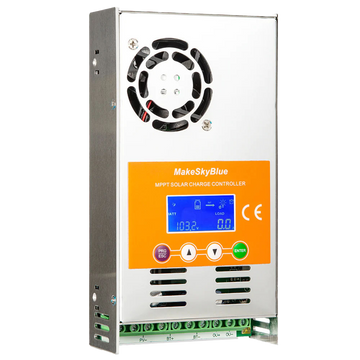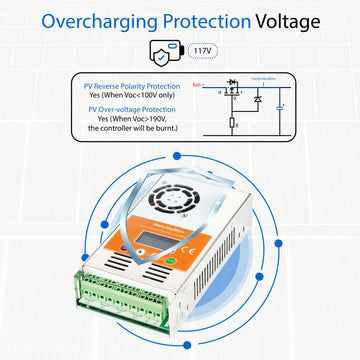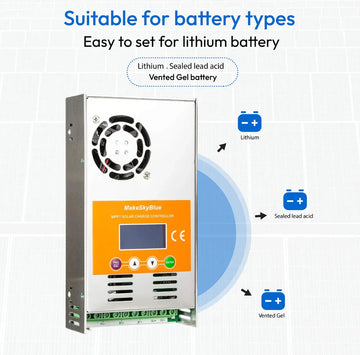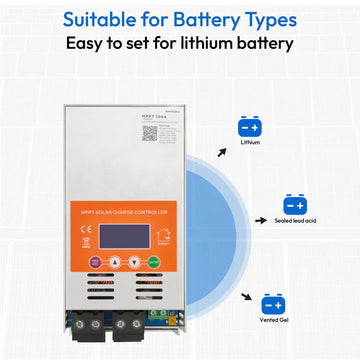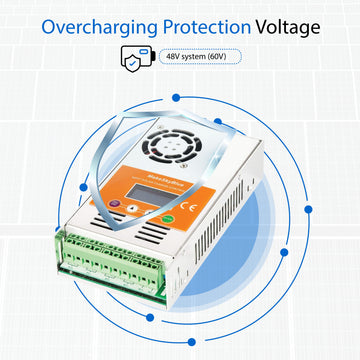You will need the best solar charge controller options to ensure that your system of solar is smooth. A solar charge controller is used to manage the movement of electricity in between solar panels and batteries. In absence of it, your batteries can be overcharged or discharged which may result in low battery lives. The correct controller will be a huge difference whether you are installing an RV solar system, a DIY solar project or a large off-grid solar power system.
Why a Charge Controller is Important
A charge controller will help to make sure your battery gets the right amount of current and voltage. The electricity produced by solar panels is fluctuating throughout the day. Without a regulator, this changing power can damage your battery. The main role of a controller is to:
-
Prevent overcharge and low voltage issues
-
Extend battery life by managing charging cycles
-
Provide safety for both the solar panel and the inverter
Some advanced models include LCD screens, Bluetooth connectivity, and load control modes. They improve ease of use and allow you to monitor performance in real time.
Types of Solar Charge Controller
There are two main types of solar charge controller: PWM and MPPT. Each one has its advantages depending on your setup, budget, and solar power system size.
PWM Solar Charge Controllers
PWM is abbreviated as Pulse Width Modulation. These are the simpler and more affordable option. They work best for smaller systems and RV setups. PWM solar charge controllers are easy to install and compatible with many types of batteries, including AGM, gel, and flood.
Nonetheless, PWM controllers do not convert solar energy effectively as compared to MPPT. They would fit better in users that require a reliable and economical alternative to the smaller solar panel systems.
MPPT Solar Charge Controllers
MPPT is an abbreviated term of Maximum Power Point Tracking. MPPT controller is an electricity controller that automatically increases and decreases voltage as well as current to extract maximum energy out of a solar panel. They are capable of efficiency up to 30 times over PWM.
These controllers are more expensive than PWM but provide better performance for larger systems. If you use lithium batteries, higher voltage panels, or want to maximize efficiency in varying weather conditions, MPPT charge controllers are the right solar charge controller for you.
Comparison of PWM and MPPT Solar Charge Controllers
|
Feature |
PWM Solar Charge Controller |
MPPT Solar Charge Controller |
|
Technology |
Pulse Width Modulation |
Maximum Power Point Tracking |
|
Efficiency Rate |
70–80% |
95–99% |
|
Best for |
Smaller systems, RV, DIY solar |
Larger systems, off-grid solar |
|
Cost |
Affordable |
More expensive than PWM |
|
Battery Compatibility |
AGM, Gel, Flood |
Lithium, AGM, Gel, Flood |
|
Weather Performance |
Limited in varying conditions |
Excellent in varying weather conditions |
|
Output Voltage |
Lower than panel |
Matches battery voltage |
RV Solar System and DIY Solar Setup
Many RV owners use a solar power system to stay off-grid while traveling. The RV solar system relies on the right charge controller to keep batteries safe. For smaller RV setups, a PWM controller often works fine. For larger RV systems with multiple panels, an MPPT controller is better for efficiency.
Solar projects designed by DIY also rely on the selection of an appropriate controller. In the process of installation of your own solar panels, inverter, as well as regulator, you will have to compute your amperage and confirm its compatibility with your battery voltage. This makes the system reliable and long-lasting in terms of the battery.
Factors to Consider When Choosing the Best Solar Charge Controller
When selecting a controller, you must look beyond price. Important factors include:
-
Battery type: Lithium, AGM, gel, or flood
-
Voltage and Amperage: Ensure the controller matches your solar panel output and battery input
-
Reliability: Choose trusted brands like Victron, Renogy, or Morningstar
-
Ease of use: Features like LCD, Bluetooth, or remote monitoring improve user experience
-
Warranty and lifespan: A long warranty ensures durability and peace of mind
Popular Solar Charge Controller Brands
|
Brand |
Type |
Amp Range |
Features |
Reliability Rating |
Warranty |
|
Victron Energy |
MPPT |
10A–100A |
Bluetooth, LCD, smart app |
Very High |
5–7 years |
|
Renogy |
PWM & MPPT |
10A–60A |
Easy setup, off-grid solar support |
High |
2–5 years |
|
Morningstar |
MPPT & PWM |
15A–60A |
Durable, trusted regulator |
Very High |
5 years |
|
EPEVER |
MPPT |
10A–80A |
Affordable, LCD display |
Medium |
2 years |
|
OutBack Power |
MPPT |
20A–80A |
Advanced off-grid systems |
High |
5 years |
Amperage and Battery Setup
The amperage rating of a charge controller is vital. For example, if your solar panel produces 40A, you must use a controller rated slightly higher. This prevents overheating and ensures reliability.
When installing, make sure the controller matches the battery voltage. A mismatch can damage the battery and reduce efficiency. Many modern MPPT controllers adjust automatically to different voltages, offering flexibility.
Reliability and Ease of Use
The controllers would help in safeguarding the life of your solar power system and increase its lifespan. The quality controllers possess low voltage disconnect, overload protection, and trickle charging.
To make it convenient, search controllers with LCD displays or mobile apps as well as with Bluetooth. These will enable you to trace charging current, system status and battery health. It is particularly applicable to DIY solar users and RV travelers who need to have rapid updates on the system.
Conclusion
The best solar charge controller is the one that fits your system size, type of battery as well as your energy objectives. PWM controller is simpler and cheaper with smaller DIY solar setups and RV solar systems. An MPPT controller will provide greater efficiency and reliability in bigger systems or when taking lithium batteries.
Such brands as Victron, Renogy, and Morningstar are reputed to be durable and effective. Keep monitoring on the voltage, amperage and compatibility before purchase. The right solar charge controller will help you to ensure that your batteries are safe, improve efficiency and make the whole solar power set last longer.
FAQs
What does a solar charge controller do?
It controls the current flow of the solar panel to the battery ensuring that the battery is not overcharged or damaged.
MPPT is more efficient and suited for larger systems, while PWM is cheaper and works well for smaller setups.
Can I use a charge controller for my RV solar system?
Yes, both PWM and MPPT controllers are used in RV setups depending on size and energy needs.
How long do solar charge controllers last?
Good controllers can last 5–10 years, depending on brand, usage, and maintenance.
Can I use lithium batteries with any controller?
Not all controllers support lithium. Choose an MPPT or compatible PWM model that clearly states lithium support.

